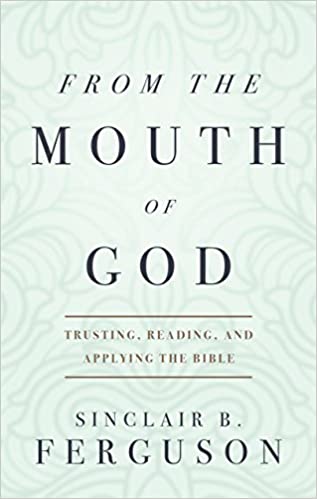Today we continue our interview with Dr. Sinclair Ferguson. If you missed yesterday’s interview, you can catch up here.
Books At a Glance (Fred Zaspel):
Explain for us what you mean by “the great chain of revelation.” How is this significant?
Ferguson:
I think I use this expression in the context of the light that our Lord’s prayer in John 17 sheds on Scripture. Of course it refers especially to the Gospels and the New Testament but actually is applicable beyond them. The Lord Jesus indicates that the Father gave him the words he spoke. Jesus is now giving his disciples the word he has heard from his Father and promising them the Holy Spirit who will (a) remind them of everything he has said (b) lead them into all the truth (which as I sometimes say “he isn’t saying to you, because you weren’t there!”), and (c) show them things to come. This is actually quite a good summary of the New Testament!
 In a sense Jesus is telling the apostles that they are the fourth link in a chain. The Father sends the Son as his Apostle with his word; the Son sends the Spirit who knows that word; the Spirit gives that word to the Apostles; then the Apostles pass on that word to us. Jesus explicitly describes us as those who else ever through the word of the Apostles – if you think about it the only way that could happen would be if their words were preserved and passed on. So, while people often think that the apostolic writings were ad hoc and incidental, in fact they are already implied in Jesus prayer, and it is clear from John 14-17 that in fact Jesus was preparing his disciples to give the New Testament to the church. So in a passage we tend to associate with other themes it is striking that John17 also gives us this marvellous sense that Christ had the new covenant Scriptures in view.
In a sense Jesus is telling the apostles that they are the fourth link in a chain. The Father sends the Son as his Apostle with his word; the Son sends the Spirit who knows that word; the Spirit gives that word to the Apostles; then the Apostles pass on that word to us. Jesus explicitly describes us as those who else ever through the word of the Apostles – if you think about it the only way that could happen would be if their words were preserved and passed on. So, while people often think that the apostolic writings were ad hoc and incidental, in fact they are already implied in Jesus prayer, and it is clear from John 14-17 that in fact Jesus was preparing his disciples to give the New Testament to the church. So in a passage we tend to associate with other themes it is striking that John17 also gives us this marvellous sense that Christ had the new covenant Scriptures in view.
Books At a Glance:
What is meant by “concursus,” and what does this have to say to those who are tempted to find hidden or coded messages in Scripture?
Ferguson:
“Concursus” is a Latin word and obviously has the basic idea of two things running alongside each other. So concurrent events take place at the same time.
Theologians use this term to describe how God operates sovereignly in providence. For example, we are active in what we do, and are responsible for our actions. Yet God works “concurrently” in relation to our actions to bring about his purposes. Two obvious illustrations of this are in Genesis 50:20 and Acts 2:23.
This divine way of working in providence is relevant to understanding how the Bible was written by men and yet at the same time is the word of God. It didn’t fall down from heaven. It wasn’t “dictated” (although there is dictation recorded in its pages!). It wasn’t written by people having mystical experiences and being in a “trance” (although there are some very remarkable experiences described in Scripture). So, when Paul dictated Romans, we should not think of him sitting waiting to “hear the voice of the Spirit” telling him what to write…. Rather, exactly what we have in Romans is a record of the thoughts he thought, the arguments he worked through, the doctrine e he understood and worked out, the emotions he felt. And yet God “breathed out” Romans, and Paul was “carried along by the Spirit” as he dictated his letters. Just as in general providence we don’t say that God contributes 50% and we contribute 50% but that we are both 100% involved in an action and its results, we should say the same about Scripture. In this sense there is a limited parallel in Christ. He is not 50% man and 50% God but truly and fully both God and man.
This is the reason we need to read Scripture in terms of what it is actually saying, and not look for special hidden meanings, or messages that are detached from what the text is actually saying.
Books At a Glance:
You make an important distinction between “rightly handling” the Word of God and using it as a “promise box.” Could you explain this for us briefly? And what bearing should this have on every Christian’s Bible reading and “quiet time”?
 Ferguson:
Ferguson:
Basically it is the difference between learning what Scripture says so that, for example, I know what Ephesians teaches, have rewarding understanding of its original message and can apply it to my own life, times, and circumstances – and on the other hand reading the Bible as though it were a box of Bible vitamin pills to give us isolated thoughts to get us through the day. Of course God does give us specific promises in his word. And yet we can both misunderstand them and misuse them unless we read them and apply them in a way that is consistent with what they are actually saying in their context. I think the big thing in getting to know whole passages and books and having a working knowledge of them is that this really enables us to grow in understanding the gospel. It is odd, isn’t it, to think that someone could have been a Bible reading Christian for years and yet might not be able to answer a non-Christian who asked “can you tell me what’s in the Sermon on the Mount?” Or Mark’s Gospel…. And might only be able to say “well, here’s a verse I found helpful two years ago”? So this is why rightly handling the Scriptures makes a big difference in our Christian lives.
Books At a Glance:
Do you have any other books in the pipeline that we can watch for?
Ferguson:
I have a backlog of unfinished manuscripts! But about to come out of the pipe is another book on John Owen, entitled: The Trinitarian Devotion of John Owen. (and on Kindle). It isn’t a long book, maybe 160 pages or so, and I hope it will both introduce John Owen to new readers and also, indeed especially, introduce readers to what it means to have fellowship with God as Trinity. Owen was a marvellous expositor of this theme, perhaps the greatest in history.
And then I have just completed a book on the theme of some of the theological and pastoral issues related to the famous controversy that took place in Scotland in the early eighteenth century called “The Marrow Controversy” – which despite its rather odd and recondite name deals with what I think are some of the most important themes I have ever written about in any of my books.
And I think I had better stop there! I (obviously!) appreciate your asking! Writing is a solitary ministry and it is an encouragement to think that somebody out there is interested in what you are doing!
Buy the books

FROM THE MOUTH OF GOD: TRUSTING, READING, AND APPLYING THE BIBLE, by Sinclair B. Ferguson
